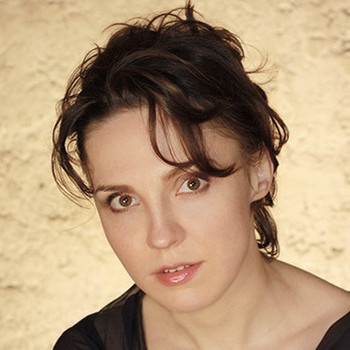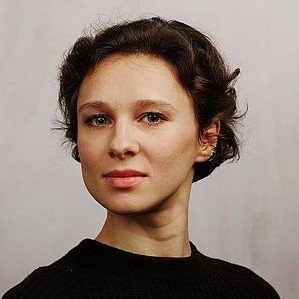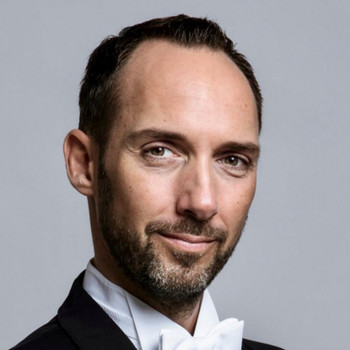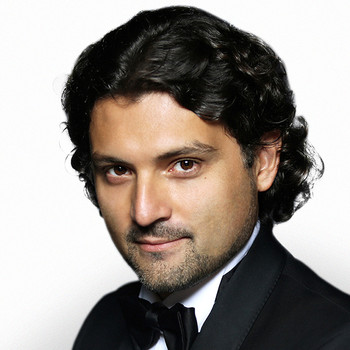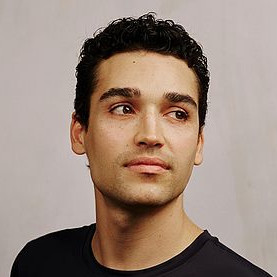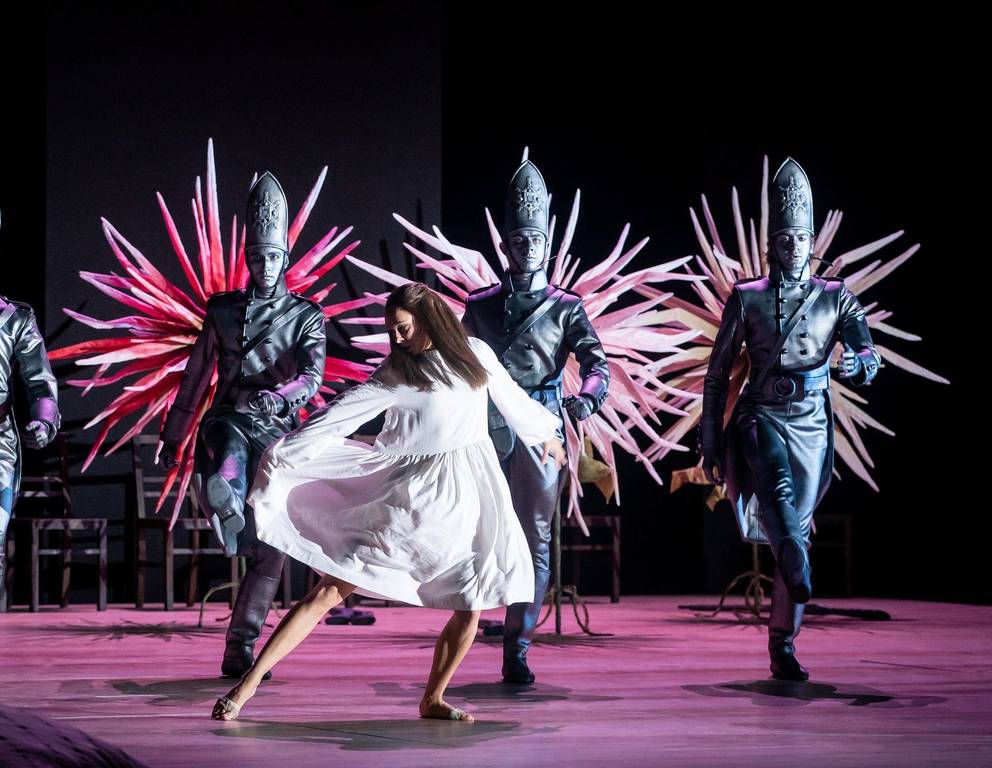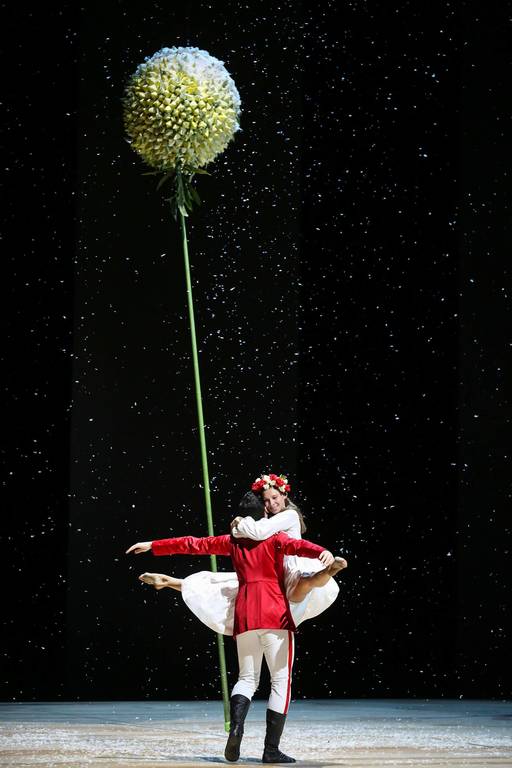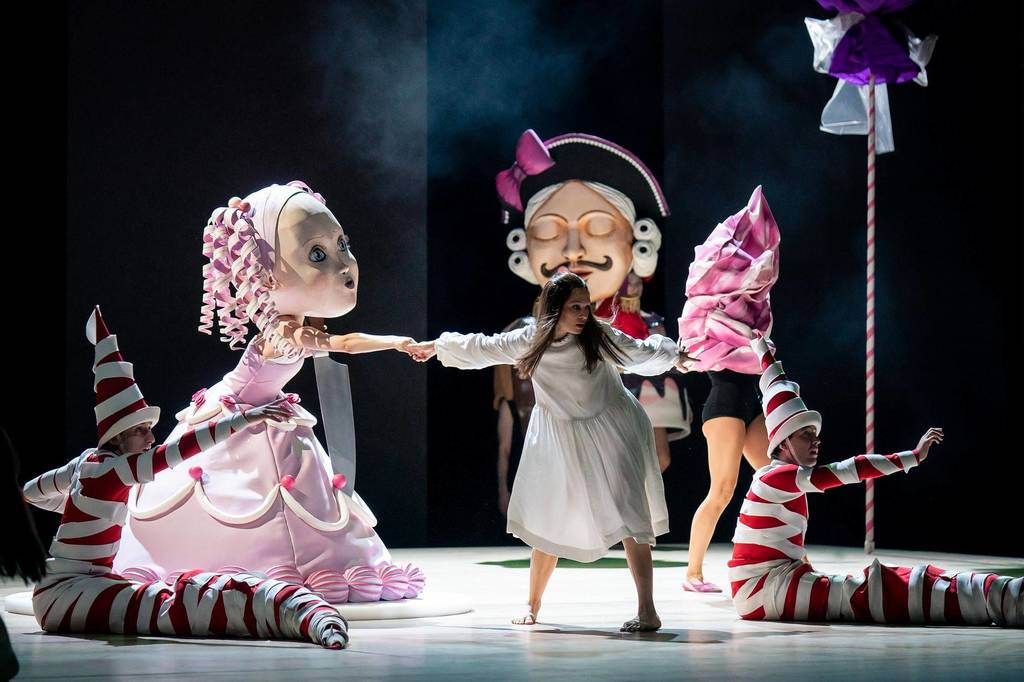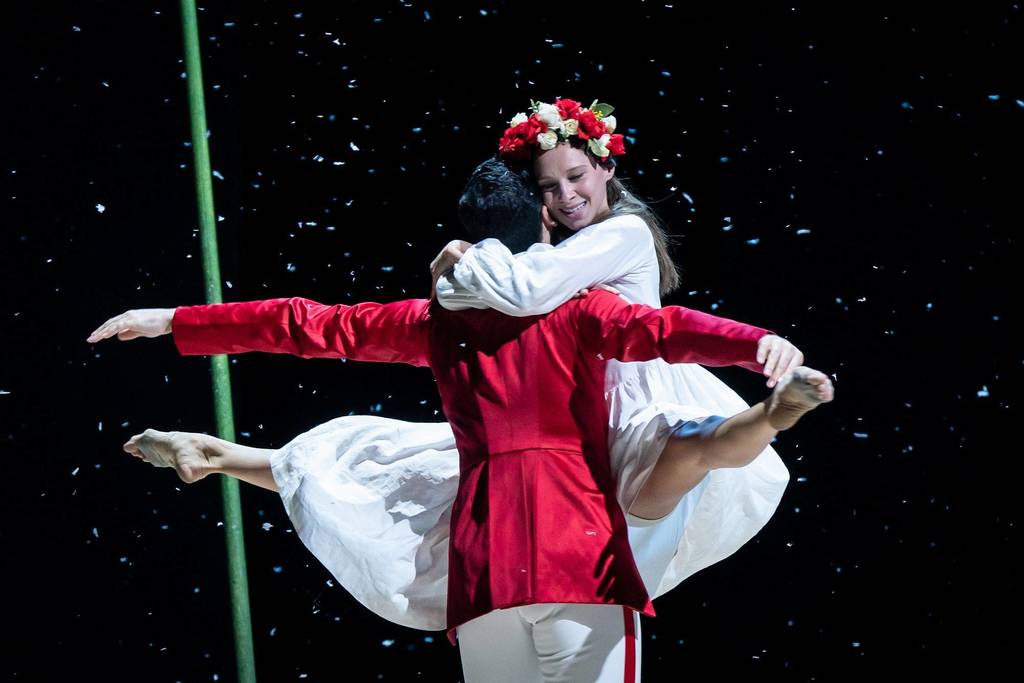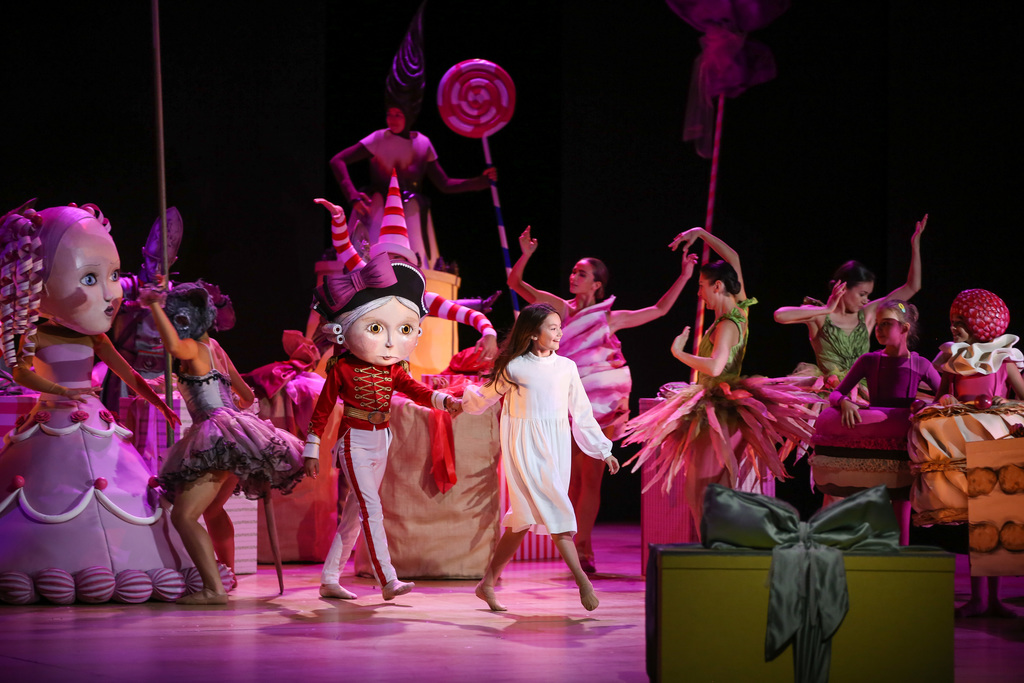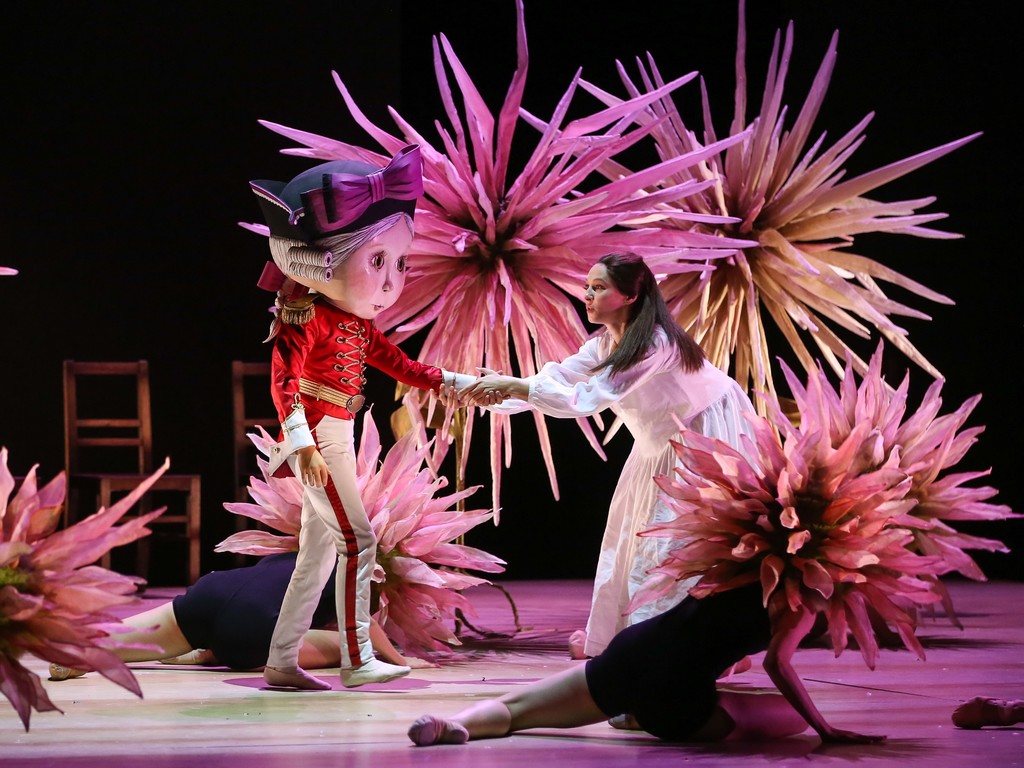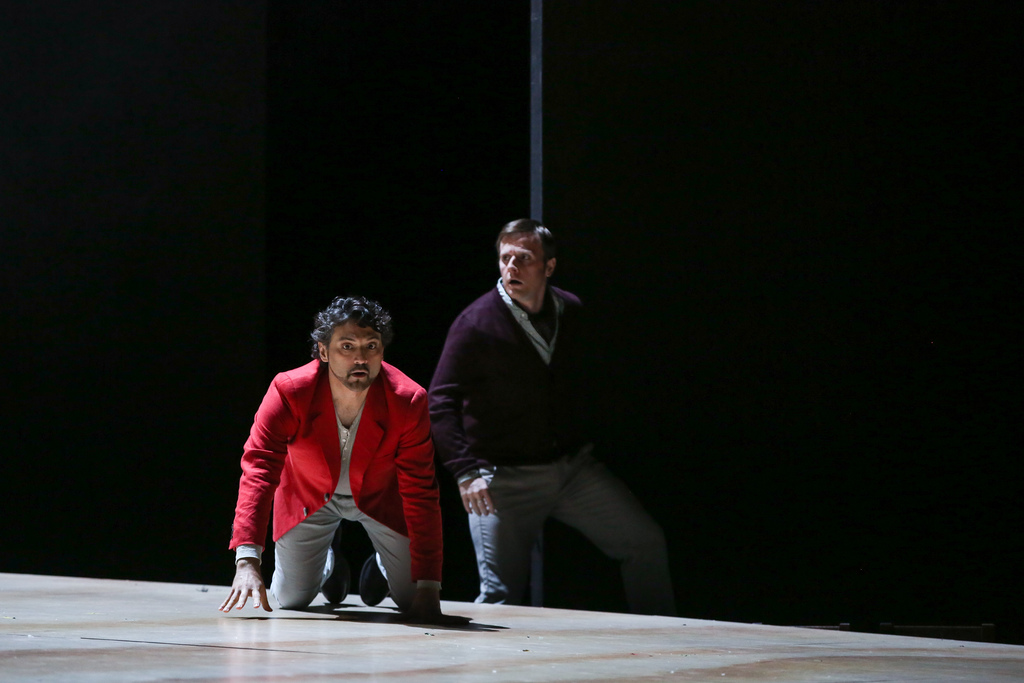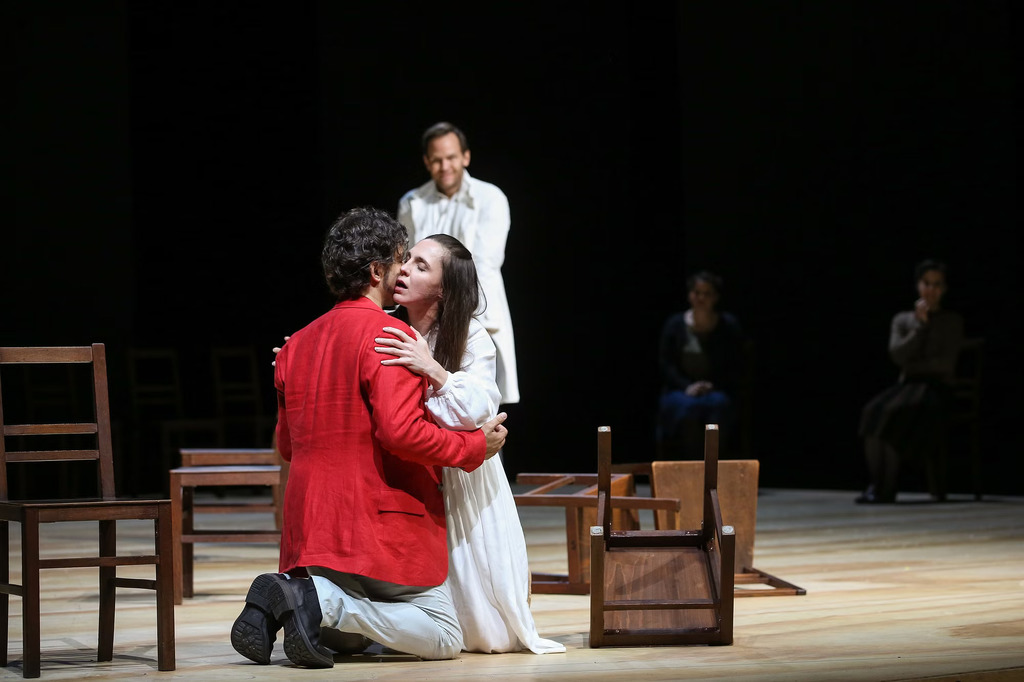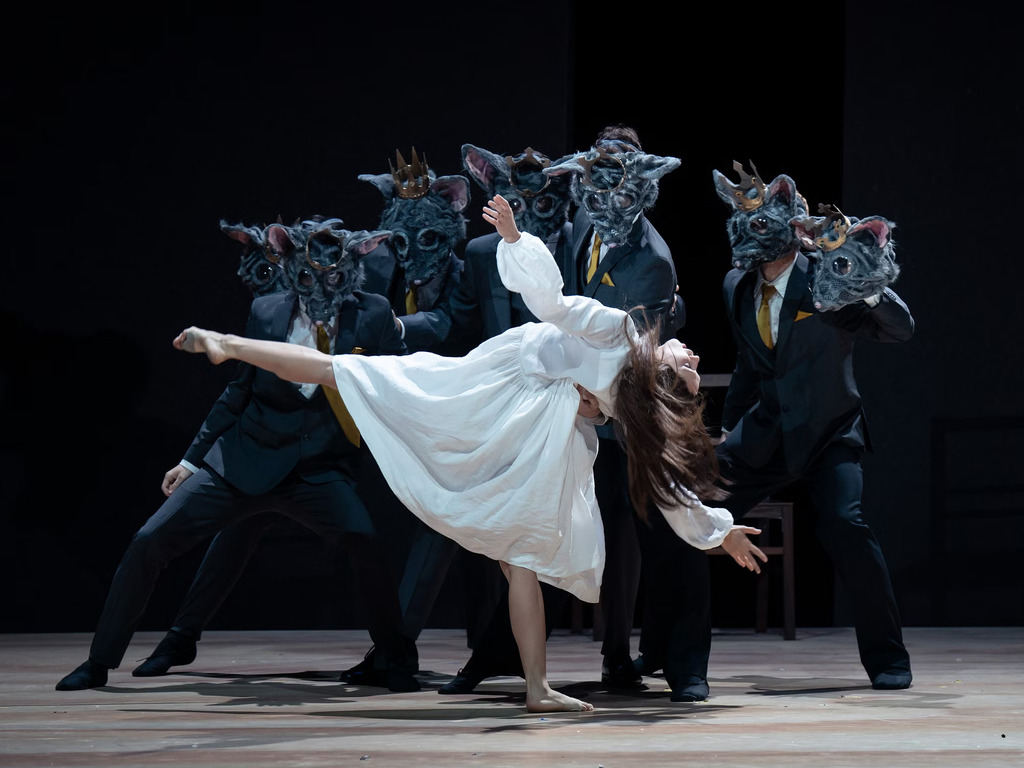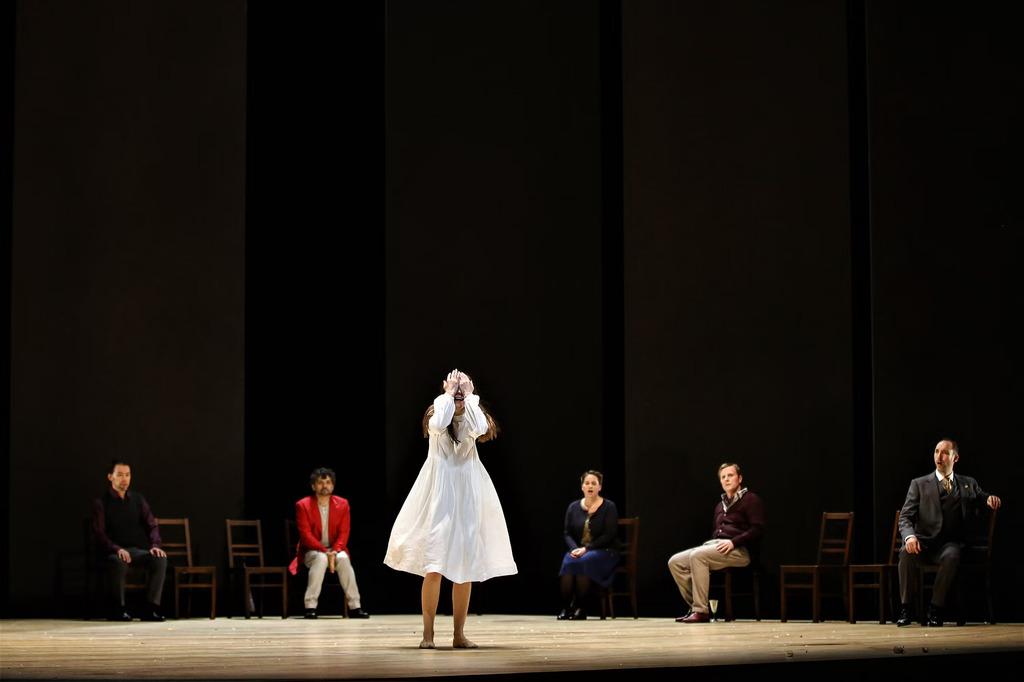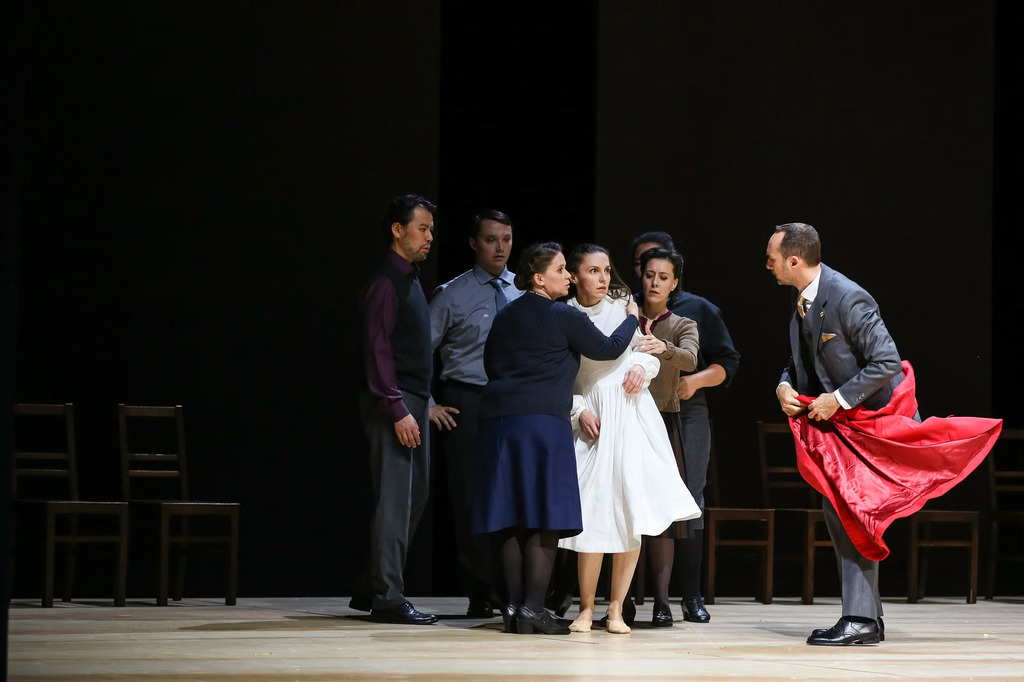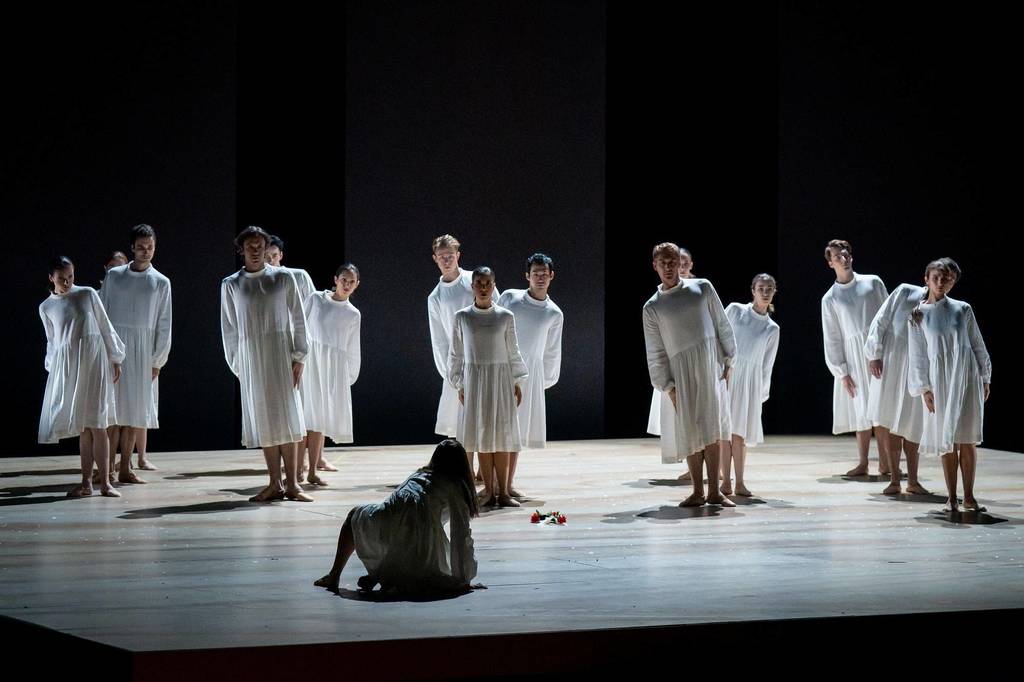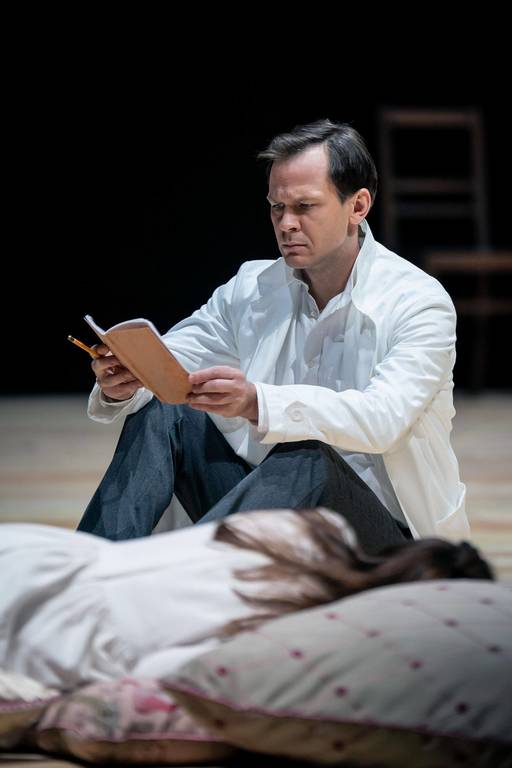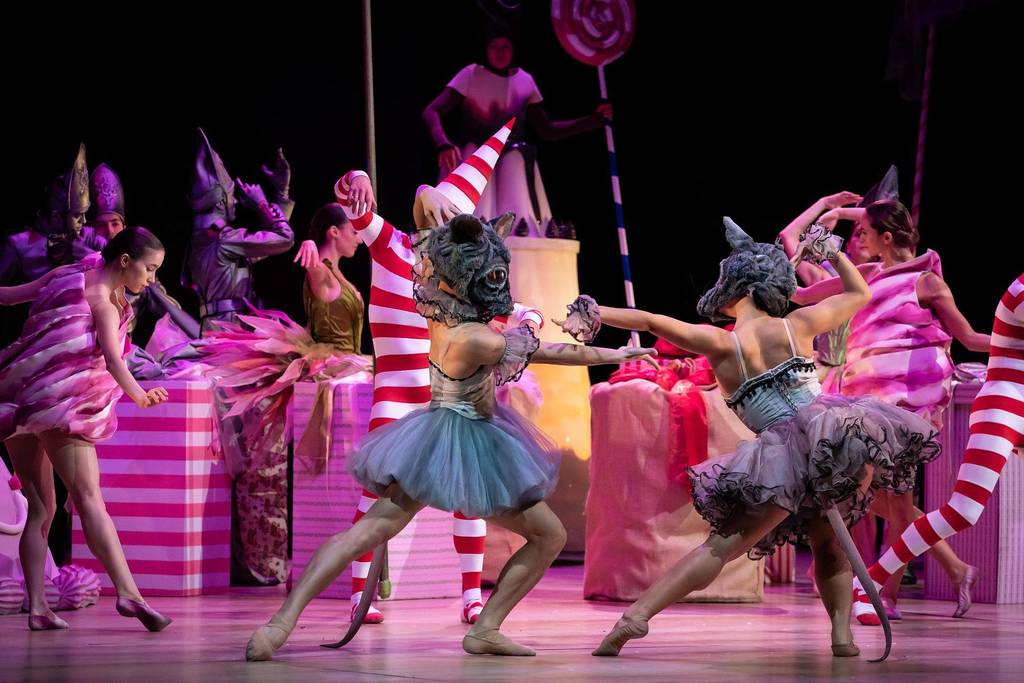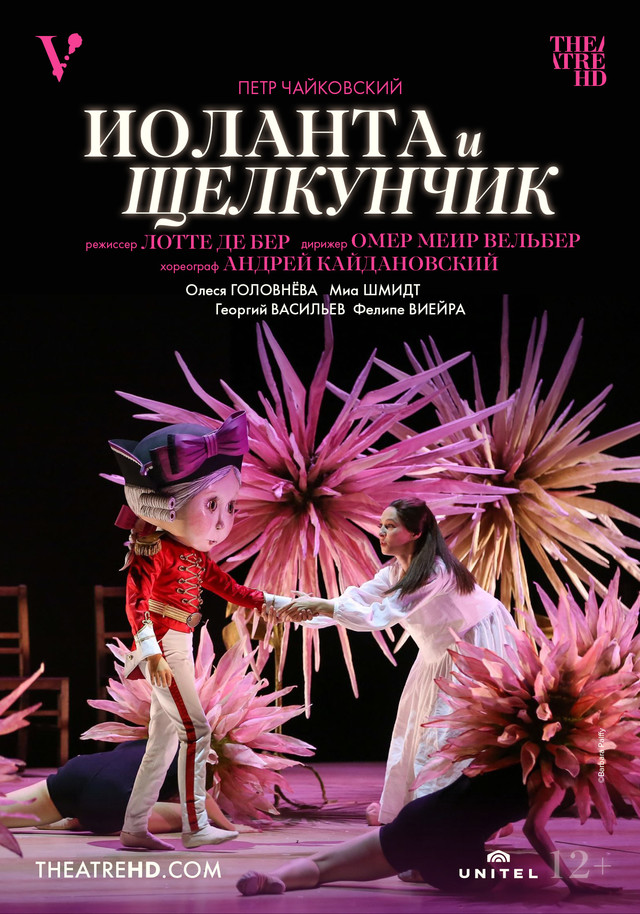
Iolanta and the Nutcracker
Иоланта и Щелкунчик
When Tchaikovsky premiered his famous ballet The Nutcracker in Saint Petersburg in 1892, it was presented as a double bill, as standard at the time, together with the opera Iolanta. The Volksoper Wien, being part home to the famous Wiener Staatsballett, under the helm of the new music director Omer Meir Wellber decided to present both works again in one evening, but not as two separate pieces, but by fusing the two works into one.
Actors
Crew
Director
Lotte de Beer
Conductor
Omer Meir Wellber
Choreographer
Andrey Kaydanovskiy
Set designer
Katrin Lea Tag
Costume Designer
Jorine van Beek
Lighting Designer
Alex Brok
Iolanta is a blind princess. A famous doctor can cure her, but only after she is being told about her blindness. Her father doesn’t want to break that horrible news to her. Lotte de Beer: “In her blindness Iolanta lives with a magical imagination of everything that surrounds her. The Nutcracker music and the dancers of the Wiener Staatsballett show us Iolanta’s world perception by her inner eye. But there comes a time in life, when you have to decide whether to remain a blind princess or to see the world in all its imperfection.” This production plays on the cutting edge of fantasy and reality, of being a child and being a grown-up, of opera and dance. In short: it’s a family-show to the core.
Princess Jolanthe is blind. Her father, King René, keeps this a secret from her. She lives in a walled garden, cared for by a well-functioning court.
Jolanthe has a great gift of imagination. In her mind's eye, she sees herself growing from a little girl into the teenager she is today, in the midst of a fairy tale world that seems completely real to her.
The little girl she was, is becoming more and more distant from her. Jolanthe wonders why her life is no longer as carefree as it used to be. She suspects that she is missing something, but she doesn’t know what it is.
Jolanthe is cared for by her nurse and two companions, who protect her from any missteps or pain. They put her to sleep. Jolanthe dreams of a fairy tale landscape with a prince in the shape of the Nutcracker.
Almerik, the king’s new armour-bearer, is warned by Bertram and Martha not to exchange so much as a word with Jolanthe. The king arrives accompanied by Ibn Hakia, a doctor who is to examine her. For Jolanthe’s healing, the king is willing to make any sacrifice.
In her dream, Jolanthe sees how oppressive she experiences her father’s protection. He appears to her as a threatening mouse king. The doctor Ibn Hakia explains that Jolanthe will only see, if she realises that she is blind and has the desire to see entirely on her own. Mind and body are interdependent, he says. The king thinks the risk is too high and refuses the treatment. Jolanthe’s imagined world turns into a nightmare in which men become frightening figures.
Robert and Vaudemont are on their way to King René’s court, Robert is to be married to Jolanthe. He does not want to marry Jolanthe because he is in love with another woman. Robert and Vaudemont get lost. They find the walled garden and ignore the warning that anyone who enters it is doomed to die.
Vaudemont discovers the sleeping Jolanthe without knowing who she is and falls in love instantly. Robert is convinced that she is an enchantress and leaves to get help.
Jolanthe offers wine. Vaudemont wonders whether the wine is poisoned. While Vaudemont drinks his wine, Jolanthe sees a love scene in her imagination.
Once again we see Robert going to get help and Vaudemont drinking the wine. But this time Jolanthe and him have a conversation. Vaudemont asks her to give him a red rose as a souvenir. When she offers him twice a white one instead, he realises that she is blind. Vaudemont explains to her what light and sight are. These first experiences of love are not fabulously beautiful for Jolanthe, but deeply confusing, unsettling and painful.
The court and the king find Jolanthe together with Vaudemont. Jolanthe reproaches her father for never having told her the truth about her blindness. She says she will undergo treatment if her father wishes. At that point, Ibn Hakia threatens to give up the possibility of a treatment.
All of a sudden, the king sees his opportunity: He addresses Vaudement, points out the warning that intruders would be killed and announces his death sentence. No one, apart from the doctor, can understand this cruel punishment from the benevolent king. Jolanthe urges the doctor to treat her. She is willing to do anything to save Vaudemont’s life. Through her inner eye, we see Jolanthe confront and overcome her fears.
When Robert returns to save his friend Vaudemont, he recognises King René. Vaudemont realises that he is in love with his friend’s fiancée. Robert confesses to the king that he does not want to marry Jolanthe. The king agrees to the marriage between Vaudemont and Jolanthe. Bertram appears and reports that the treatment was a success. Jolanthe sees! The world has changed. Jolanthe does not know what she sees. Everyone praises God, including Jolanthe who is happy with Vaudemont.
Jolanthe thinks back to all her struggles and decides to recolour reality using her imagination.
Art makes reality bearable.
Jolanthe has a great gift of imagination. In her mind's eye, she sees herself growing from a little girl into the teenager she is today, in the midst of a fairy tale world that seems completely real to her.
The little girl she was, is becoming more and more distant from her. Jolanthe wonders why her life is no longer as carefree as it used to be. She suspects that she is missing something, but she doesn’t know what it is.
Jolanthe is cared for by her nurse and two companions, who protect her from any missteps or pain. They put her to sleep. Jolanthe dreams of a fairy tale landscape with a prince in the shape of the Nutcracker.
Almerik, the king’s new armour-bearer, is warned by Bertram and Martha not to exchange so much as a word with Jolanthe. The king arrives accompanied by Ibn Hakia, a doctor who is to examine her. For Jolanthe’s healing, the king is willing to make any sacrifice.
In her dream, Jolanthe sees how oppressive she experiences her father’s protection. He appears to her as a threatening mouse king. The doctor Ibn Hakia explains that Jolanthe will only see, if she realises that she is blind and has the desire to see entirely on her own. Mind and body are interdependent, he says. The king thinks the risk is too high and refuses the treatment. Jolanthe’s imagined world turns into a nightmare in which men become frightening figures.
Robert and Vaudemont are on their way to King René’s court, Robert is to be married to Jolanthe. He does not want to marry Jolanthe because he is in love with another woman. Robert and Vaudemont get lost. They find the walled garden and ignore the warning that anyone who enters it is doomed to die.
Vaudemont discovers the sleeping Jolanthe without knowing who she is and falls in love instantly. Robert is convinced that she is an enchantress and leaves to get help.
Jolanthe offers wine. Vaudemont wonders whether the wine is poisoned. While Vaudemont drinks his wine, Jolanthe sees a love scene in her imagination.
Once again we see Robert going to get help and Vaudemont drinking the wine. But this time Jolanthe and him have a conversation. Vaudemont asks her to give him a red rose as a souvenir. When she offers him twice a white one instead, he realises that she is blind. Vaudemont explains to her what light and sight are. These first experiences of love are not fabulously beautiful for Jolanthe, but deeply confusing, unsettling and painful.
The court and the king find Jolanthe together with Vaudemont. Jolanthe reproaches her father for never having told her the truth about her blindness. She says she will undergo treatment if her father wishes. At that point, Ibn Hakia threatens to give up the possibility of a treatment.
All of a sudden, the king sees his opportunity: He addresses Vaudement, points out the warning that intruders would be killed and announces his death sentence. No one, apart from the doctor, can understand this cruel punishment from the benevolent king. Jolanthe urges the doctor to treat her. She is willing to do anything to save Vaudemont’s life. Through her inner eye, we see Jolanthe confront and overcome her fears.
When Robert returns to save his friend Vaudemont, he recognises King René. Vaudemont realises that he is in love with his friend’s fiancée. Robert confesses to the king that he does not want to marry Jolanthe. The king agrees to the marriage between Vaudemont and Jolanthe. Bertram appears and reports that the treatment was a success. Jolanthe sees! The world has changed. Jolanthe does not know what she sees. Everyone praises God, including Jolanthe who is happy with Vaudemont.
Jolanthe thinks back to all her struggles and decides to recolour reality using her imagination.
Art makes reality bearable.
